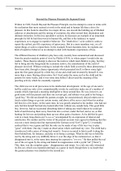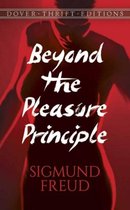B412011
Beyond the Pleasure Principle By Sigmund Freud
Written in 1920, Freud's Beyond the Pleasure Principle was his attempt to come to terms with
his realization that more seemed at work in the mind and in human life than a drive for
pleasure. In this book he describes two major drives, one toward the building up of libidinal
cathexes or attachments and the raising of excitation, the other toward their diminution and
ultimate extinction. In this less speculative section, he discusses an example of an important
principle he felt he had discovered in human life, and that is the tendency to repeat
experiences or to engage in repetitive behavior. The "death drive," as he called it, seeks to
repeat the earliest, pre-life experience of quiescence. But in a more mundane way, we all
repeat things or seek to repeat them. In the example Freud elucidates here, he explains one
kind of repetitive behavior as an attempt to deal with traumatic experiences of loss.
The different theories of children's play have only recently been summarized and discussed
from the psycho-analytic point of view by Pfeifer (1919), to whose paper I would refer my
readers. These theories attempt to discover the motives which lead children to play, but they
fail to bring into the foreground the economic motive, the consideration of the yield of
pleasure involved. Without wishing to include the whole field covered by these phenomena, I
have been able, through a chance opportunity which presented itself, to throw some light
upon the first game played by a little boy of one and a half and invented by himself. It was
more than a mere fleeting observation, for I lived under the same roof as the child and his
parents for some weeks, and it was some time before I discovered the meaning of the
puzzling activity which he constantly repeated.
The child was not at all precocious in his intellectual development. At the age of one and a
half he could say only a few comprehensible words; he could also make use of a number of
sounds which expressed a meaning intelligible to those around him. He was, however, on
good terms with his parents and their one servant-girl, and tributes were paid to his being a
"good boy." He did not disturb his parents at night, he conscientiously obeyed orders not to
touch certain things or go into certain rooms, and above all he never cried when his mother
left him for a few hours. At the same time, he was greatly attached to his mother, who had not
only fed him herself but had also looked after him without any outside help. This good little
boy, however, had an occasional disturbing habit of taking any small objects he could get
hold of and throwing them away from him into a corner, under the bed, and so on, so that
hunting for his toys and picking them up was often quite a business. As he did this he gave
vent to a loud, long-drawn-out "o-o-o-o," accompanied by an expression of interest and
satisfaction. His mother and the writer of the present account were agreed in thinking that this
was not a mere interjection but represented the German word "fort" ["gone"]. I eventually
realized that it was a game and that the only use he made of any of his toys was to play
"gone" with them. One day I made an observation which confirmed my view. The child had a
wooden reel with a piece of string tied round it. It never occurred to him to pull it along the
floor behind him, for instance, and play at its being a carriage. What he did was to hold the
reel by the string and very skillfully throw it over the edge of his curtained cot, so that it
disappeared into it, at the same time uttering his expressive "o-o-o-o." He then pulled the reel
out of the cot again by the string and hailed its reappearance with a joyful "da" ["there"].
This, then, was the complete game - disappearance and return. As a rule one only witnessed
its first act, which was repeated untiringly as a game in itself, though there is no doubt that
the greater pleasure was attached to the second act.
1





